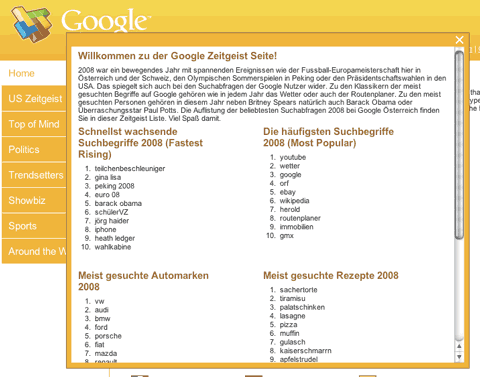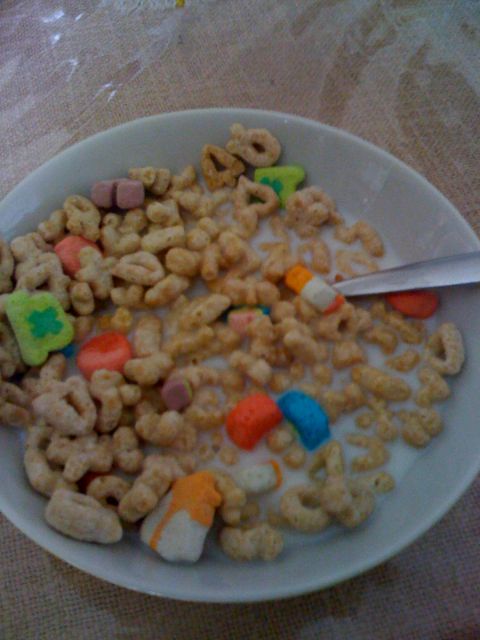-
Confessed Apple fanboy Stephen Fry gets finger time with the iPad — and face time with Steve Jobs.
links for 2010-03-31
-
For those who would like to rebrand all their food to Dharma Initiative nutrition items. Or for the season finale parties.
-
Brandkarma is a new website that lets users rate brands in order to „help everyone make better brand choices and influence brand behaviour for good“. Nice idea, but they should allow users access without registration.
What if Economists were in charge?
I am a big fan of Steven D. Levitt and Stephen J. Dubner’s Freakonomics, both book and blog, and their refreshing perspective on „the hidden side of everything“. Only recently they have launched Freakonomics Radio, a regular podcast which I recommend to everyone who is observing people and numbers.
I just got around to listen to the last episode What Would the World Look Like if Economists Were in Charge? This speculative question opens another truly entertaining and informative podcast episode. I had to laugh out loud at Mart Laar’s description of his encounter with Margaret Thatcher. I found Stephen Levitt’s anecdote of his daughter at the end especially insightful, as it explains why negotiators (like lawyers) and not number people run the show in politics.
Superfreakonomics is already on my bookshelf, but given my current workload this will have to wait until July i am afraid.
Breakfast is for lovers…
The Lurpak campaign by Wieden+Kennedy, London is one of my favourite recent advertising campaigns. I like the insight and strategy behind it and how they were translated into marvellous ads (with long copy). The rhythm, images and focus on what good you can make with Lurpak (instead of promising some super-healthy proposition) are a pleasing contrast to the usual screaming of advertising.
Yesterday evening a new series of print and television ads went on air: „Saturday is Breakfast Day“ (via the W+K London blog).
Inspire people to make Saturday a breakfast day. The brilliant copy and images are mouthwatering and inspiring. Again, the focus is on something you can make WITH Lurpak instead of some obscure promise what Lurpak does for you. Improve your Saturday, enjoy a wonderful breakfast, add Lurpak. Brilliant.
I believe this resonates with many people in general (breakfast people like my wife or non-breakfast people like me) and Britain’s situation in particular.
It is hardly a coincidence that this piece appeared in today’s Times. Camilla Cavendish makes observations about the British and food that could very well be in the brief for the Lurpak campaign:
Most of us are confused. […] We balk at paying for raw ingredients, but readily cough up for extortionate ready meals. We spend hours watching TV chefs but apparently only 13 minutes on average making a meal – down from one hour in 1980.
and the last paragraph, where she recalls Carlo Petrini, founder of Slow Food, drawing the contrast
between Britain’s “pornographic” onslaught of recipes and TV chefs, and the “act of true love” that he believes is making food from traditional, local ingredients.
Imagine that commercial.
Hello Sunshine
Google Zeitgeist 2008
Google has published Google Zeitgeist 2008 this week. This yearly summary of the year’s most popular searches at Google. So what is interesting here?

The results for the most popular searches in Austria are odd: youtube, orf, ebay, hotmail, wikipedia, herold… Not just Austria, all over the world people seem to mix up address bar and the search field.
This implies a few things: first, this seems to be a basic design flaw in internet browsers. Of course, the address bar is commonly placed on top, but for most people attention is drawn to the all important input field in the center of the start page. (Or, if I recall correctly, in Internet Explorer people’s inputs in the address bar are redirected to a search engine when no website is found)
Whatever the cause one can’t help but notice, secondly, people (the significant majority) are nowhere near internet-savvy. In some countries more, in some countries less. Really successful in the web business are the people who really acknowledge and exploit this fact: hackers, phishers and spammers. On the legal end of the spectrum, most internet advertising and market seems to just talk and connect to the experienced internet user segment.
Thirdly: Why bother printing your web-address on ads? Or, if you are internet service like check24.de or monster.at: Why bother confusing your clients with adresses? What has to stick is the brand name, and then you have to make sure you own the search results when it is entered.
And lastly, it probably pays to buy yourself into the searches for names of your competitors. Say someone wants to get to eBay, googles eBay and as first result gets the paid ad for Ricardo.at, an Austrian auctioning site. Admittedly, eBay know their stuff too well, but for most other brands you can position yourself right in front of your competition’s gates.
New Amnesty International commercial: „You Are Powerful“
Usually, I am not a big fan of the commercials made for AI or other human rights groups. Most of them feel like lion bait with lots of emotion, shock etc. instead of seriously trying to win people for the cause.
But I do like this new commercial for Amnesty International. I like that it dramatically visualizes what I believe Amnesty is about (and why I am a member): normal people stepping in when human rights are violated. You might discuss the effect that effort has in reality, as in the YouTube comments. But without Amnesty and all the people engaging, the world would be a much worser place.
Edit: Agency is Mother, London. http://www.motherlondon.com/
Lucky charms
Wild raspberry muffins
- « Previous Page
- 1
- …
- 9
- 10
- 11
- 12
- 13
- …
- 16
- Next Page »



